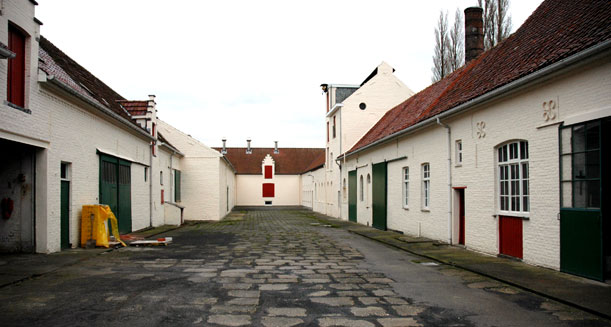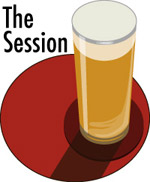
 Oops. The “Session #91: My First Belgian” snuck up on me, and I must finish a presentation on “Brewing Belgian IPA” and be on the road to Kansas City. So for the third time in the seven-plus years of The Session I’m going to repeat a story from “Brew Like a Monk.” It was the first time I thought about abbey beers in the way I do now. The story is from Achel, and the photo from Westvleteren. For newer material, check the links Session host Breandán Kearney at Belgian Smaak is accumulating.
Oops. The “Session #91: My First Belgian” snuck up on me, and I must finish a presentation on “Brewing Belgian IPA” and be on the road to Kansas City. So for the third time in the seven-plus years of The Session I’m going to repeat a story from “Brew Like a Monk.” It was the first time I thought about abbey beers in the way I do now. The story is from Achel, and the photo from Westvleteren. For newer material, check the links Session host Breandán Kearney at Belgian Smaak is accumulating.
Inside the brewery café at the monastery of the Saint Benedictus Abbey of Achel, only a single food server and one monk putting items on his cafeteria tray remained when Marc Beirens opened the door and stepped into a chilly December evening.
Beirens, a businessman who has been visiting monasteries since he was a child, took a few strides into a terrace area that was once the abbey’s courtyard. As the sky above turned from dark blue to black, he nodded back toward the brewery, located in a space that once housed the monastery dairy, then to a new gallery and gift shop to his right. Those buildings held pigs and more cattle, before it became obvious agriculture would not sustain the community.
“You should have seen this all a few years ago,” he said, his voice bouncing lightly about an otherwise silent courtyard.
*****
During the next few hours Beirens and Brother Benedict, the monk in charge of marketing when I visited in December of 2004 gave me a complete tour of the monastery and its small brewery. Always a good host, Brother Benedict insisted I try the beers.
Staring with Extra, a substantial 9.5% beauty served from a 750ml bottle. He didn’t drink himself, talking a little business with Beirens, answering my questions about the monastery, and excusing himself after his cell phone rang. He returned a little later. “This is the same bottle?” he asked, knowing the answer was yes. “You don’t like the beer.” He laughed mightily.
He ordered we have another, then headed off again. Both Beirens and I ordered the Achel 5, a blonde beer of 5.3% abv, and compared it to the 5% abv Westmalle Extra. When Brother Benedict returned, he looked at our blonde beers, working on a scowl. He took a sip of one. “Water,” he said, once again laughing.
*****
Beirens appreciates the importance of commerce to the monasteries, and that the six Trappist breweries are part of a larger family. He distributes a range of monastic products — beer is the best selling, but they include cookies, soap, vegetables, wine, and other goods — throughout Belgium and France. His father did the same. “I’ve been visiting monasteries since I was this high,” he said earlier, holding his hand below his waist. That’s why he understands something else about monasteries.
It was dark now, and the courtyard empty.
“I love the silence,” Beirens said. “I used to have a friend who was a monk. He’s gone now.”
We walked along in silence.
“When he was 80 or so, I’d still call him. If I had a problem I could go see him. He didn’t have to say anything and I’d feel better.
“All it took was silence.”